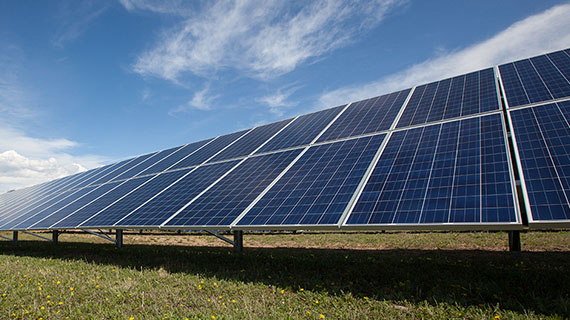
CEC is a new idea in power generation that is building, operating and maintaining community-shared clean energy facilities. CEC is pioneering the model of delivering clean power-generation through medium-scale facilities that are collectively owned by participating utility customers. CEC's proprietary software automatically calculates monthly credits for members and integrates with the utilities' existing billing system. Our Mission

RooflessSolar (community solar) is an optimally located off-site solar facility that enables any resident or business to take advantage of solar power, even those who rent or lease. Customers receive the benefits of going solar, without the worry of installation or maintenance.
Get StartedCEC has developed proven software and services that allow for on-time market community solar deployments. For utilities seeking to offer their own community solar program, but are unsure where to begin, CEC is the solution.
Get Started
States Served

Projects Online

Megawatts Online

Under Development
Clean Energy Collective is a new idea in power generation that is building, operating and maintaining community-based clean energy facilities. Based in Carbondale, Colorado, CEC is pioneering the model of delivering clean power-generation through medium-scale facilities that are collectively owned by participating utility customers. CEC's proprietary RemoteMeter™ system automatically calculates monthly credits for members and integrates with utilities' existing billing system.
Power enables us to look at the road ahead, and to see into dark places. It warms our homes and keeps our families safe. It fuels our technology, tools and our imaginations. Power connects us to one another and liberates us to make what was impossible yesterday, a reality today.
But not all power is created equally, nor is it available to everyone. At CEC we know there is a better way. We believe that knowledge and inspiration have the power to transform skeptics into advocates. We understand that we exist as a part of something bigger and at our core, we empower others to achieve their visions.
We look to the future and see not only the path less traveled, but the path no one has discovered. We improve the world we all live in by providing affordable, community-shared, clean energy solutions that allow utilities and consumers alike to turn great ideas into tangible results. Constantly evolving products and services to deliver exceptional value to our customers can be exhausting. So we attract people who are driven by the desire to do what others have deemed impossible. We are a collection of inspired people looking at the future, providing the power to shift from what can be, to what is.
Status: Taking Reservations
Customers: Residential, Commercial, Government, Nonprofit
Utility: NEC Retail
Size: 904,500 W
152 CR 308Status: Panels available
Customers: Residential, Commercial, Government, Nonprofit
Utility: Yampa Valley Electric Association
Size: 579,080 W
1006 County Rd 177Status: Panels available
Customers: Residential, Commercial, Government, Nonprofit
Utility: National Grid
Size: 1,012,600 W
62 Commerce DriveStatus: Panels available
Customers: Residential, Commercial, Government, Nonprofit
Utility: Black Hills Energy
Size: 124,800 W
57th Lane and Hwy. 50Status: Panels available
Customers: Residential, Commercial, Government, Nonprofit
Utility: National Grid
Size: 1,384,320 W
217 East RoadStatus: Sold out
Customers: Residential, Commercial
Utility: Xcel Energy
Size: 499,895 W
1600 South 66th Street
In addition to inventing CEC’s community solar concept, Mr. Spencer leads the company’s ongoing vision and execution. He is a serial entrepreneur, having built 10 companies in the last 22 years within various industries including energy, software, systems engineering, medical, brokerage and real estate development. He has also held management positions for Qwest as the Director of Business Development for a 14-state southeast region and a VP of Sales for First Consulting Group (now CSC). Mr. Spencer has received a patent for past designs and hundreds of copyrights. He lives off the grid in a self-sustaining home with his wife, has a Bachelor of Science degree in Electrical Engineering and is the president of the board of Tom's Door, a local non-profit. He enjoys the outdoors, skiing and playing basketball.

Bart Rupert brings his solid track record of creating growth and success to CEC through managing and growing the many Information Technology and platform needs. Prior to joining CEC, he served as the COO of Plexis Healthcare Systems where the company grew through strategic alliances with large companies such as Accenture, CSC, Cognizant, and Noridian, and became one of Microsoft’s HHS Strategic Alliance partners. He also served as the COO of Crib Notes Software, a niche EMR company, cultivating the organization into an internationally-recognized market leader, and has worked with large industry players including HBOC, McKesson, and FCG in various leadership roles.

Tom Sweeney brings a wealth of experience to CEC in the development and management of high growth businesses with ground breaking products and services. Most recently, Tom was the founder, Chairman and CEO of Incentra Solutions, a $200 million IT Systems Integrator for mid-tier enterprise clients in the US and Western Europe. Prior to Incentra, Tom lead a series of IT services and software companies in the US, Europe and Asia/Pac. Sweeney started his career in the Telecommunications industry and worked as a senior executive at Level 3, Worldcom, MFS, Centex and MCI. Outside of work Tom enjoys golf, blue water sailing and spending time with his wife and two sons.

As Chief Operating Officer, Mr. Postal oversees the day-to-day operations and overall execution of the sales, marketing, business development and delivery departments. Prior to joining CEC Mr. Postal served as Chief Development Officer of SunShare, Renewable Energy Executive with Milender White Construction and was a co-founder of Main Street Power. Prior to his career in solar, he was a fiduciary investment advisor for both A.G. Edwards and as a partner in an independent advisory firm based in Denver. Mr. Postal received his BA in History from University of Colorado and a Master in Public Policy from Georgetown University. He lives in Denver with his wife and three kids.

Vilia Valentine has extensive experience in increasing investor value and driving financial growth through IPO’s, secondary offerings, and strategic acquisitions. Prior to joining CEC, Vilia served as CFO of Inspirato LLC, a private luxury vacation club. Previously, she was the principal financial officer of MDC Holdings, a $1 billion public homebuilding and financial services company, and CFO of Gaiam Inc., a leading producer of lifestyle media and fitness accessories. In 2008, she took Gaiam’s solar operations public, and in 2009, she was named "CFO of the Year" in the public company category by the Denver Business Journal. Vilia is a Colorado native and earned her BS in Accounting and Business Law.

With over 20 years business and legal experience is the sustainable energy field, Mr. Cunningham is responsible for overseeing the legal aspects of the company. His background is diverse, also including significant energy services, real estate, engineering & construction, lending, acquisitions and sales experience. He has also owned and operated several successful start-up and high-growth businesses, and successfully combines an entrepreneurial mindset with sound legal practices. Mr. Cunningham enjoys exploring the Colorado mountains, and has been known to head to sunny beaches in the winter for a scuba break.

Mr. Hunter is responsible for originating and securing all required capital for CEC, including corporate equity, tax equity, construction financing, term debt and mezzanine financing. Prior to CEC, he created and led a number of successful energy development companies, each of which was acquired by institutional investors. Mr. Hunter studied Mechanical Engineering at Rutgers University, and is a graduate of the EMBA-Global program, a joint MBA degree offered by Columbia and London Business Schools.
Your inquiry has been successfully sent and we appreciate your interest.
We will be contacting you soon.
Please fill out the form below with any general questions you may have regarding RooflessSolar or Clean Energy Collective. We will not share your information with any third parties. Thank you!
|
|
A RooflessSolar specialist will be contacting you within 36 hours.
|
Clean Energy Collective Terms of Use for Websites and | |
| Last Updated: May 2015
Thank you for choosing Clean Energy Collective! |
|
| Please Note: the following Terms of Use overview refers to software services related to enrolling in a Clean Energy Collective (CEC) program. These Terms of Use do NOT describe the terms of your participation in a Community Solar Array and the benefits of your solar system. For more information regarding benefits, terms and conditions of participating in a CEC Community Solar Array, please refer to the website, proposal, customer agreement and Solar Specialist for your market. | |
|
1. What These Terms of Use Cover. |
|
|
These Terms of Use apply to any RemoteMeter, MyCleanEnergy or other CEC software or services, including but not limited to updates, that display or link to the Terms of Use and that you use while these Terms of Use are in force. All of the software or services are referred to as the "service" or "services". Sections 1 through 21 of these Terms of Use apply across the service. The term ("term") of these Terms of Use for the service shall be for the lifetime of the customer agreement and/or system purchase so long as the panels continue to be located in a CEC licensed facility.
|
|
|
2. When You May Use the Service. |
|
|
You may start using the service as soon as you have finished the sign-up process. No withdrawal right or other 'cooling off' period applies to the service and you waive any applicable 'cooling off' period, except if the law requires a 'cooling off' period despite your waiver and even when a service starts right away. |
|
|
3. How You May Use the Service. |
|
In using the service, you will:
|
|
|
4. How You May Not Use the Service. |
|
In using the service, you may not:
|
|
|
5. You Are Responsible For Your Service Account. |
|
|
Only you may use your service account. For some parts of the service, we may notify you that you may set up additional member accounts that are dependent on your account (an 'associated account'). You are responsible for all activity that takes place with your service account or an associated account. You may not authorize any third party to access and/or use the service on your behalf except where CEC provides a mechanism for third parties to access the service on your behalf. |
|
|
6. Associated Accounts; Accounts From Third Parties. |
|
|
If you are the user of an associated account, the holder of the service account has full control over your associated account. This includes the right to end the service, close or alter your associated account at any time and, in some cases, request and receive machine and service use information related to your associated account. If a third party, such as a utility, employer or school, gave you your account, the third party has rights to your account. The third party may manage your account, reset your password, or suspend or terminate your account; view your account's usage and profile data, including how and when your account is used; and read or store the content in your account, including electronic communications and other information. |
|
|
7. Your Content. |
|
| You may be able to submit content for use in connection with the service. You understand that CEC does not control or endorse the content that you and others post or provide on the service. Except for material that we license to you, we do not claim ownership of the content you post or provide on the service.
The service includes public areas available to the general public, shared areas available to others you have selected and personal areas where you have not granted access to others. If you share content with others on the service, in either public or shared areas, then you understand and agree that others with whom you have shared content may use that content. You grant to those members of the public to whom you have permitted access free, nonexclusive permission to use, copy, distribute and display the content solely in connection with the service and other CEC products and services. If you do not want others to have those rights, please do not share your content with them. You understand that CEC may need and you hereby authorize CEC to use, modify, copy, distribute and display content posted on the service to the extent necessary to provide the service. This includes:
You understand that sharing content that violates others' copyrights and other intellectual property rights violates these Terms of Use. You represent and warrant that you have all the rights necessary for you to grant the rights in this section 7 and that the use and publication of the content does not breach any law. We will not pay you for your content. We may refuse to publish your content and may remove your content from the service at any time. |
|
|
8. Privacy. |
|
| In order to operate and provide the service, we collect certain information about you. We use and protect that information as described in the CEC Online Privacy Statement, http://www.easycleanenergy.com/privacy. In particular, we may access or disclose information about you, including the content of your communications, in order to: (a) comply with the law or respond to lawful requests or legal process; (b) protect the rights or property of CEC or our customers, including the enforcement of our agreements or policies governing your use of the service; or (c) act on a good faith belief that such access or disclosure is necessary to protect the personal safety of CEC employees, customers or the public.
The service is a private computer network that CEC operates for the benefit of itself and its customers. CEC retains the right to block or otherwise prevent delivery of any type of email or other communication to or from the service as part of our efforts to protect the service, protect our customers or stop you from breaching these Terms of Use. The technology or other means we use may hinder or break your use of the service. In order to provide you the service, we may collect certain information about service performance, your machine and your service use. We may automatically upload this information from your machine. This data will not be used to personally identify you. You may read about this information collection in more detail in the privacy statement at http://www.easycleanenergy.com/privacy. |
|
|
9. Software. |
|
| If you receive software from us as part of the service, your use of that software is under the terms of the license or subscription that is presented to you for acceptance for that software. We reserve all other rights to the software.
We may automatically check your version of the software. We may automatically download upgrades to the software to your computer to update, enhance and further develop the service. Unless we notify you otherwise, your license to use the software will end on the date your service ends, and you must promptly uninstall the software. We may disable the software after the date the service ends. You will not disassemble, decompile, or reverse engineer any software included in the service, except and only to the extent that the law expressly permits this activity. |
|
|
10. How We May Change the Terms of Use. |
|
|
If we change this Terms of Use, we will tell you prior to your continued use. If you do not agree to these changes, then you must cancel and stop using the service before the change takes place. If you do not stop using the service, then your continued use of the service will constitute acceptance to the changed Terms of Use. |
|
|
11. WE MAKE NO WARRANTY. |
|
|
We provide the service 'as-is,' 'with all faults' and 'as available.' We do not guarantee the accuracy or timeliness of information available from the service. We and our affiliates, resellers, distributors, partners and vendors (collectively, the 'CEC parties') give no express warranties, guarantees or conditions. You may have additional consumer rights under your local laws that this Terms of Use cannot change. We exclude any implied warranties including those of merchantability, fitness for a particular purpose, workmanlike effort and non-infringement. |
|
|
12. LIABILITY LIMITATION. |
|
|
You can recover from the CEC parties only direct damages up to an amount equal to any amounts, if any, you have paid for the service during the prior 30 days. You cannot recover any other damages, including consequential, lost profits, special, indirect, incidental or punitive damages. This limitation applies to anything related to:
Some states do not allow the exclusion or limitation of incidental or consequential damages, so the above limitations or exclusions may not apply to you. They also may not apply to you because your province or country may not allow the exclusion or limitation of incidental, consequential or other damages. |
|
|
13. Suggestions. |
|
|
The CEC shall have a royalty-free, worldwide, transferable, sublicenseable, irrevocable, perpetual license to the use to incorporate into the services any suggestions, enhancement requests, recommendations or other feedback provided by you, relating to the operation of the services. |
|
|
14. Changes to the Service; If We Cancel the Service; Pre-Release. |
|
|
We may change the service or delete features at any time and for any reason. We may cancel or suspend your service at any time. Our cancellation or suspension may be without cause and/or without notice. Upon service cancellation, your right to use the service stops right away. Once the service is cancelled or suspended, any data you have stored on the service may not be retrieved later. Our cancellation of the service will not alter your obligation to pay all charges made to your billing account. If we cancel the service in its entirety without cause within the first six years of service, then we will refund to you on a pro-rata basis the amount of any payments that you have made corresponding to the portion of the six years of service. A particular service may be a pre-release version and may not work correctly or in the way a final version might work. There may be interruptions or extended downtimes. We may significantly change the final version or decide not to release a final version at all. |
|
|
15. Interpreting the Terms of Use. |
|
|
All parts of this Terms of Use apply to the maximum extent permitted by law. A court may hold that we cannot enforce a part of this Terms of Use as written. If this happens, then you and we will replace that part with terms that most closely match the intent of the part that we cannot enforce. The rest of this Terms of Use will not change. This is the entire Terms of Use between you and us regarding your use of the service. It supersedes any prior Terms of Use or statements regarding your use of the service. If you have confidentiality obligations related to the service, those obligations remain in force (for example, you may have been a beta tester). The section titles in the Terms of Use do not limit the other terms of this Terms of Use. |
|
|
16. Assignment. |
|
|
We may assign this Terms of Use, in whole or in part, at any time with or without notice to you. You may not assign this Terms of Use, or any part of it, to any other person without the prior written consent of the CEC. Any attempt by you to do so is void. You may not transfer to anyone else, either temporarily or permanently, any rights to use the service or any part of the service. |
|
|
17. No Third Party Beneficiaries. |
|
|
This Terms of Use is solely for your and our benefit. It is not for the benefit of any other person, except for permitted successors and assigns under this Terms of Use. |
|
|
18. Claim Must Be Filed Within One Year. |
|
|
Any claim related to this Terms of Use or the service may not be brought unless brought within one year. The one-year period begins on the date when the claim first could be filed. If it is not filed in time, then that claim is permanently barred. This applies to you and your successors. It also applies to us and our successors and assigns. |
|
|
19. Your Notices to Us. |
|
| You may notify us as stated in the customer support or 'Contact' area for the service or our web site at www.easycleanenergy.com. We do not accept e-mail notices. | |
|
20. Notices We Send You; Consent Regarding Electronic Information. |
|
|
This Terms of Use is in electronic form. We have promised to send you certain information in connection with the service and have the right to send you certain additional information. There may be other information regarding the service that the law requires us to send you. We may send you this information in electronic form. You have the right to withdraw this consent, but if you do, we may cancel your service. We may provide required information to you:
Notices provided to you via e-mail will be deemed given and received on the transmission date of the e-mail. If you do not consent to receive any notices electronically, you must stop using the service. |
|
|
21. Choice of Law and Location for Resolving Disputes. |
|
|
Colorado state law governs the interpretation of this Terms of Use and applies to claims for breach of it, regardless of conflict of laws principles. You and we irrevocably consent to the exclusive jurisdiction and venue of the state or federal courts in Eagle County, Colorado, U.S.A., for all disputes arising out of or relating to this Terms of Use. |
|
|
NOTICES |
|
|
Copyright and Trademark Notices |
|
|
All contents of the service are Copyright © 2010-2015 Clean Energy Collective, LLC and/or its suppliers, 401 Tree Farm Drive, Carbondale, Colorado 81623 U.S.A. All rights reserved. Copyright and other intellectual property laws and treaties protect any software or content provided as part of the service. We or our suppliers own the title, copyright and other intellectual property rights in the service, software or content. Clean Energy Collective, RemoteMeter, MyCleanEnergy and/or other CEC products and services referenced herein may also be either trademarks or registered trademarks of CEC in the United States and/or other countries. Any rights not expressly granted herein are reserved. |
|
|
Production and Consumption Information |
|
|
Production and Consumption information (including, without limitation, facility values) appearing on the service are delayed. Consumption information is routinely provided by your electric utility. Information indicated as "real-time" may be affected by delays in transmission over the Internet and by other causes. Production information is owned by the CEC. You are permitted to store, manipulate, analyze, reformat, print and display the information only for your personal use. In no event shall you publish, retransmit, redistribute or otherwise reproduce any CEC or utility information in any format to anyone, and you shall not use any CEC or utility information in or in connection with any business or commercial enterprise, including, without limitation, any securities, investment, accounting, banking, legal or media business or enterprise. Neither CEC, the utility nor its affiliates or their respective licensors make any express or implied warranties (including, without limitation, any warranty or merchantability or fitness for a particular purpose or use) regarding the CEC or utility information. Neither CEC nor its affiliates or their respective licensors will be liable to any user or anyone else for any interruption, inaccuracy, delays, error or omission, regardless of cause, in the CEC information or for any damages (whether direct or indirect, consequential, punitive or exemplary) resulting therefrom. |
|
|
Support |
|
|
Customer support is not offered for the service, unless provided otherwise in this Terms of Use or the materials we publish in connection with a particular service specify that it includes customer support. |
|
|
||||||||||||||||||||||||||||||||||||||||||